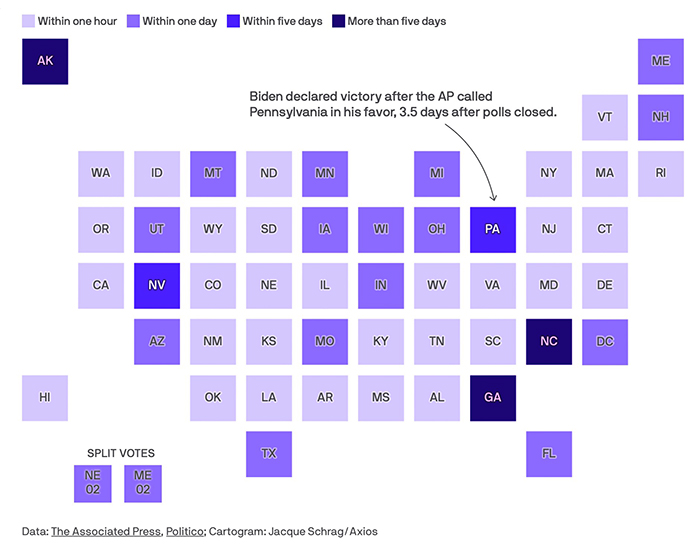

Don't count on knowing who will be president an hour after the polls close on the West Coast. Or even a day after. That notwithstanding, do expect Donald Trump to claim victory on Election Night, possibly soon after the polls close in the Eastern Time Zone. How long did it take the AP to call the winner in each state in 2020? Axios has produced this graphic to show it.

As soon as Trump declares victory, he is also likely to demand that the counting of votes stop, even in states where ballots postmarked on or before Election Day must be counted even if they arrive after Election Day (up to some limit). His supporters may back him up, but of course, local election authorities will follow state law, not Trump's wishes. There could be a period of confusion and uncertainty all night and possibly the next day, especially if not all counting has been completed on Election Night. Many states do not want election workers to work through the night because they are in stressful jobs and are entitled to get some sleep. So counting often stops around midnight and starts again around 8 a.m. the next day, possibly with no result when they stop.
This pause will cue the rumor mill to start generating falsehoods and conspiracy theories at full blast. A CBS study showed that 55% of Elon Musk's 48,000 tweets about election security since 2020 contain false or misleading information. He won't be the only one. If Trump believes he is losing, he will flood the zone with lies.
In close races, it can take a very long time to get a final count. It took the AP 3½ days to make a call in Pennsylvania in 2020. North Carolina (10 days) and Georgia (16 days) were the worst and were only called after hand recounts of all the ballots had been completed. Fortunately, Biden didn't need those electoral votes to win, but suppose he did. It would have taken over two weeks to know who won, with all the uncertainty and screaming that would have entailed. Shades of Florida in 2000. With seven swing states this time, we might have to wait a bit. And it is possible that the Supreme Court gets involved, as it did in 2000. We are not lawyers, but we do know that presidential elections are run according to state law, so the final call should generally rest with the relevant state Supreme Court, unless some state clearly violated federal law, which is unlikely. But the Supreme Court might not see it that way. Chief Justice John Roberts was allegedly very surprised by the public reaction to the Dobbs decision. If he and his buddies overrule some state Supreme Court and declare Trump the winner, the reaction to Dobbs will be small potatoes.
Each state has its own procedures for counting votes. Here are the procedures used by the seven swing states:
So expect prolonged uncertainty, rumors, lies, conspiracy theories, disputes, court challenges over everything, and probably hand recounts in multiple states. Markets will be in turmoil. Election workers will be worked to the bone and harassed. We wouldn't be surprised if some of them simply gave up midcount and quit their jobs, creating even more chaos. And when all the results are in, the court challenges will be revved up. We hope John Roberts and his eight friends have cleared their docket for November and December. They're going to have to work overtime then. (V)